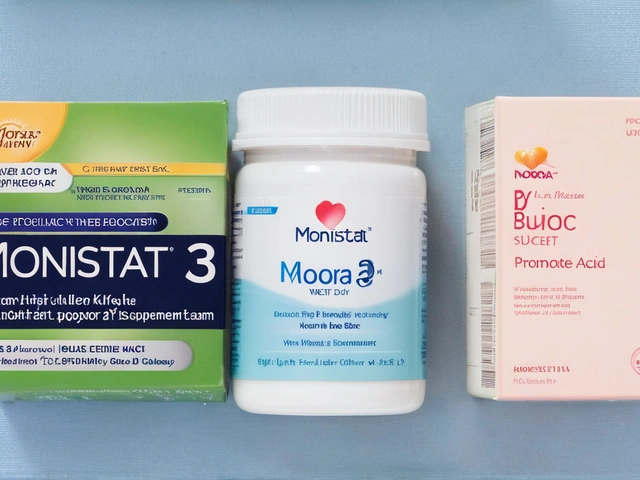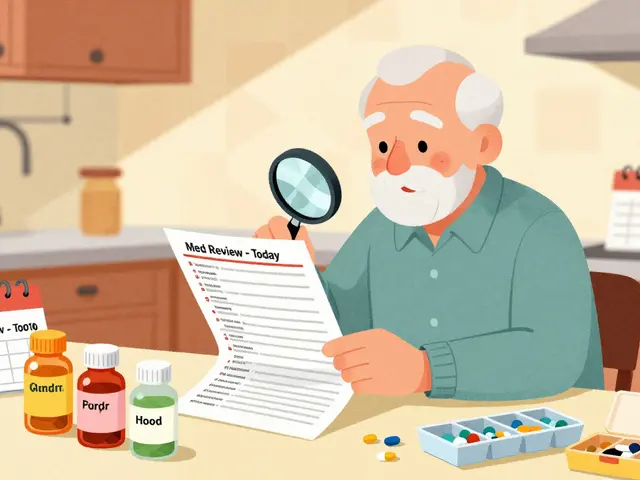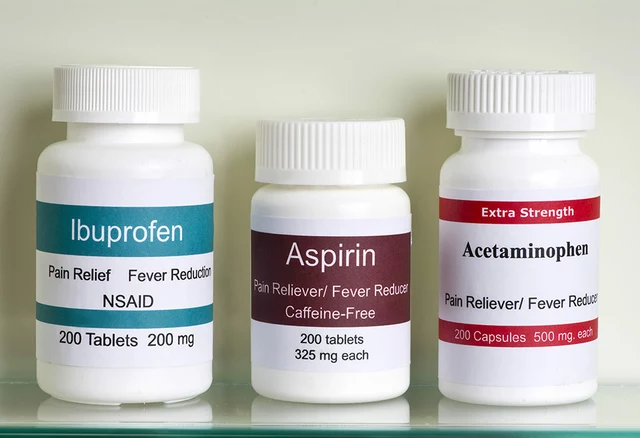Picture this: It's a sunny morning, you want to get outside, but you know the minute you step out, your nose will start running, your eyes will itch, and you’ll wish you stayed in bed. Allergy season is relentless, right? That’s why so many folks turn to Zyrtec. But what actually sets it apart from other allergy meds on the shelf? How does it work, and what should you expect? Knowing the real deal lets you decide whether to keep that box handy or look for something else.
What is Zyrtec and How Does it Work?
Zyrtec is the brand name for cetirizine, one of those go-to allergy meds you’ve probably seen at every pharmacy. It first hit pharmacy shelves in the U.S. in 1995, and a few years after, it was approved for over-the-counter sales. What’s cool is that Zyrtec is a second-generation antihistamine, which means it targets allergies without making you super drowsy like the old-school stuff—Ever tried Benadryl before a meeting? Yeah, not fun. Cetirizine works by blocking histamine, a chemical your body pumps out during allergic reactions. That’s the stuff causing itchy eyes, sneezing, runny noses, and sometimes those weird hives that pop up out of nowhere.
What does this mean in real life? Studies have shown Zyrtec starts fighting symptoms in as little as an hour for most people, sometimes even faster. The effects last up to 24 hours, so you don’t need to keep popping pills all day. According to a 2023 study published in the Journal of Allergy and Clinical Immunology, Zyrtec’s rapid onset and long duration made it especially popular for people with unpredictable lifestyles—think parents, pet owners, or folks who just want to go out and not worry about pollen counts.
Unlike first-generation antihistamines, Zyrtec doesn’t cross the blood-brain barrier as easily, so you’re way less likely to feel knocked out. Drowsiness can still hit some people—about 10% of users feel sleepy, compared to up to 30% with older meds. That’s a big deal when you need to focus at work or drive. Another bonus is that cetirizine doesn’t usually come with weird side effects like dry mouth or urinary retention that you get with traditional allergy pills.
What about kids? Zyrtec is one of only a handful of antihistamines approved for use in children as young as six months old. Pediatricians like it because it works fast and doesn’t make little ones bounce off the walls or zonk out. There’s even a syrup version to make things easier for the under-12 crowd who can’t swallow pills. That’s one of those behind-the-scenes things that help parents everywhere.
Doctors sometimes prescribe Zyrtec off-label for things totally unrelated to pollen—think food allergies, chronic urticaria, or even itchy skin caused by kidney or liver problems. It’s versatile and relatively safe, which is why you’ll hear people raving about how it saved their summer from non-stop sneezing fits—or gave their dog a break from constant scratching (yep, vets sometimes recommend it for pets, but double-check dosing with your vet first).
What’s the science backing all this up? Here’s a quick peek at some data you won’t see on the box:
| Who Uses Zyrtec? | Why? | How Long Does Relief Last? |
|---|---|---|
| Adults (18+) | Seasonal allergies, pet allergies, hives | Up to 24 hours |
| Kids (6 months+) | Sneezing, watery eyes, allergic itch | Up to 24 hours |
| Older Adults (65+) | Night-time nasal allergies, chronic itch | Up to 24 hours |
Cetirizine also comes in generic form, so you can grab a bottle for less cash if you’re on a budget. Still, Zyrtec’s trusted brand name keeps it popular among regulars who don’t want to switch up their routine.

Allergy Relief: The Real-Life Zyrtec Experience
So many allergy meds promise the world but barely get your symptoms under control. What’s it really like after you swallow a Zyrtec? People who pop one usually start off feeling that wave of relief: their nose won’t drip like a leaky faucet, those endless sneezes slow down, and eyes don’t feel like sandpaper. Within ninety minutes, most people report a noticeable difference—and some even swear by Zyrtec as their personal “magic pill.” But those numbers aren’t just internet buzz. A randomized clinical trial in 2022 found about 70% of allergy sufferers maintained full relief after a single daily dose of Zyrtec. Pretty solid odds.
Day-to-day, Zyrtec fits seamlessly into busy routines. Take it with breakfast and head out—no waiting around or worrying about chasing symptoms later. It doesn’t matter if you’re crushing an early-morning run, shuttling the kids, or sitting through endless Zoom meetings. The main thing you might notice: a sense of "normal" returns. Suddenly, picnics, mowing the yard, or spring cleaning don’t sound like torture.
If you’re a pet person, this one’s for you. Zyrtec tackles dust and dander allergies, which are brutal if you live with a fluff monster but love them too much to say goodbye. Got a new kitten and can’t stop sneezing? Zyrtec might be the game-changer. Some pet owners also dose up before visiting allergic friends or houseguests. The 24-hour coverage means less juggling and more living.
On tough pollen days, though, even Zyrtec has its limits. When sneezing fits hit hard, some allergy vets recommend using Zyrtec alongside other tactics, like saline rinses, air purifiers, and avoiding windows. Don't expect a miracle pill to bulldoze through every single trigger. Still, for most folks—especially those hit hard by grass and tree allergies—Zyrtec consistently outranks older meds for sheer convenience and stamina.
Quick tip: Even though Zyrtec is marketed as “non-drowsy,” the effect isn’t zero. Don’t take your first dose right before a long drive. Try it out on an easy day to see how your body responds—and if you notice drowsiness, try splitting your daily dose into two smaller ones. Night owls sometimes prefer to take their Zyrtec right before bed, just in case. For a large segment of the population, though, there’s no sleepy haze—just sweet relief.
The pill or syrup form cracks open options. Some definitely prefer chewables (life-saver for kids) or the classic tablet. Zyrtec-D (with a decongestant) is available, too, but a word of warning: the decongestant can spike your heart rate and mess with sleep, so check with your doctor if you have heart or blood pressure concerns.
Mixing Zyrtec with alcohol isn’t a smart combo, even if you’re not feeling sleepy. Both can slow your reaction time, and some folks become way more sluggish. Also, if you’re on other medications—especially for anxiety or depression—check with a pharmacist to make sure you’re not accidentally doubling up side effects.
Let’s talk hidden perks. Some folks with chronic hives (called chronic urticaria) swear by daily Zyrtec. Studies from 2021 show about 60% reduction in symptoms for many patients, which is huge for anyone tired of awkward itching or welts appearing out of nowhere. It’s also a good option for cold-induced itching after swimming or outdoor winter sports.

Possible Side Effects and Pro Tips for Using Zyrtec
No pill is perfect, and Zyrtec is no exception. While it’s safer than a ton of allergy meds, there are a few things you’ll want to watch for. Top of the list? Drowsiness—usually mild but enough to make you think about timing your dose. Other possible side effects: a dry mouth, mild headache, or even a sore throat for some. About 1 in 25 users experience a dry mouth, which isn’t a big deal, but it can be annoying. Less commonly, some people get an upset stomach or feel a little jittery. Here’s the thing: most side effects fade as your body gets used to the med.
Kids do well with Zyrtec, but always go for the age-appropriate dose and check with a pediatrician. Babies as young as six months can use Zyrtec with the right dosing, but never guess—kids’ bodies are different, and too much can cause grogginess or, ironically, make them hyper. If you’ve got a teen athlete or driver in the family, have them take their first tablet on a “safe” day to be sure it won’t slow their reflexes. Elderly folks can be extra sensitive to drowsiness, too, so keep an eye out and start low if you’re introducing it to a grandparent.
If you’re on daily Zyrtec during peak allergy months, try taking it at the same time every day. Sticking to a routine keeps levels steady in your system. If you skip a day, just get back on track—don’t double up. Want to boost your allergy guard? Many allergy doctors suggest combining Zyrtec with lifestyle tweaks: use air conditioning, keep windows closed, shower before bed to wash off outdoor pollen, and wash clothes after spending time outside. Zyrtec is strong, but a few small habit changes can dial symptoms way down.
- If you accidentally take an extra dose, don’t panic—most people tolerate one extra tablet just fine. If you feel unwell, though, or if a kid got into the bottle, call Poison Control or your doctor just to be safe.
- If you have liver or kidney problems, talk to your doctor first. Since Zyrtec is filtered mostly by the kidneys, doctors often suggest lowering the dose if your kidneys aren’t working at 100%.
- Pregnant or breastfeeding? There’s no solid proof Zyrtec harms babies, but it hasn’t been tested as much as some other options. Most docs say Claritin or Benadryl might be a safer bet unless they give you the green light for Zyrtec. Always talk to the pros if you’re expecting or nursing.
- Be smart about combining Zyrtec with other allergy meds. If you’re thinking about layering with nasal sprays, eye drops, or another antihistamine, ask a pharmacist. Too much of a good thing can backfire with double-dosing and extra side effects.
Sometimes, folks notice Zyrtec works great for months and then feels less effective. Your body doesn’t actually build up a true “tolerance” like with caffeine or cold meds, but allergies themselves can morph with changing seasons or exposure. If you hit that wall where nothing works, check in with a doctor. Sometimes you’ll need a tweak to your plan or testing for triggers you didn’t even know about. Some allergists advise rotating between different second-gen antihistamines, like switching between Zyrtec and Allegra every few months, though hard science doesn’t always back this up. Don’t fall for all the hype online about “antihistamine resistance” — instead, just listen to your body and stay flexible.
Zyrtec doesn’t interact much with food or drinks, so you can take it with or without meals. Big meals can slow the absorption a bit, but not in a way you’ll really notice unless you’re looking for second-by-second changes. Chewable Zyrtec tablets usually taste sweet—it’s a syrupy cherry flavor—so even picky young ones won’t gag.
If you’re tracking the latest research, check this out: A report in Pediatric Allergy and Immunology (2024) confirmed that Zyrtec remains one of the top two most-recommended allergy drugs for both children and adults worldwide, beating out many older antihistamines for safety and speed. That’s why it’s a medicine cabinet staple for so many families across the globe.
Here’s the nutshell: Zyrtec is a smart, safe bet for fast and steady allergy relief. It works for all ages, hits symptoms within the hour, and backs it up with a long track record of success and minimal side effects. Just keep an eye on drowsiness, stick to dosing rules, and use those common sense tips to get the most out of every allergy season.







katerine rose
30 May 2025 - 18:57 PM
I took Zyrtec last week and my allergies vanished like magic. No more sneezing fits during Zoom calls. I didn't even need to close the windows. Life is good. 🙌
Selma Cey
30 May 2025 - 21:57 PM
You call this relief? Allergy meds are just corporate placebo pills designed to keep you dependent. Nature doesn't need chemicals. Let your body adapt. Or maybe you're just weak.
Francis Pascoe
31 May 2025 - 17:14 PM
I've been on Zyrtec for 8 years. I used to cry during pollen season. Now I run marathons in April. This drug saved my life. If you're still sneezing, you're doing it wrong.
Richa Shukla
1 June 2025 - 20:36 PM
zrytec?? u kno its made by big pharma?? they put stuff in it to make u dependant!! i read it on a forum!! my cousin in delhi got sick after takin it!! they r lyin to us!! 😱
Chris Rowe
2 June 2025 - 04:31 AM
Zyrtec? Nah. I just breathe through my mouth and call it a day. Works better than any pill. Also cheaper. Also, why are we paying for brand names? 🤡
Sushmita S
2 June 2025 - 19:51 PM
I tried Zyrtec and my eyes stopped watering 😭 but then I got a headache 😩 maybe its the pollen... or maybe its the pills... idk anymore 🤷♀️
AnneMarie Carroll
4 June 2025 - 07:46 AM
You people act like Zyrtec is some miracle. It's just a second-gen antihistamine. We've had better options since 2002. Why are you still using this? It's not even the most effective. You're just lazy.
John K
4 June 2025 - 11:26 AM
USA makes the best meds. Zyrtec? American science. Other countries? They still use old junk. Don't even get me started on India. 🇺🇸💯
Laura Anderson
5 June 2025 - 21:28 PM
The philosophical underpinning of pharmaceutical reliance is a symptom of modern alienation. We outsource our bodily autonomy to chemical solutions because we've lost touch with natural rhythms. Zyrtec is not medicine-it's a bandage on a severed artery.
Avis Gilmer-McAlexander
6 June 2025 - 21:01 PM
I used to hate allergy season until I found Zyrtec. Now I actually enjoy spring. I take mine with my coffee and watch the birds. It's not just a pill-it's a little slice of peace. 🌸
Jerry Erot
8 June 2025 - 07:13 AM
I read a study once that said cetirizine has a slightly higher incidence of drowsiness in elderly populations. Just saying. You might want to check your dosage if you're over 65.
Fay naf
9 June 2025 - 23:07 PM
Zyrtec's pharmacokinetic profile is suboptimal for patients with renal impairment. The half-life extends significantly when GFR falls below 50 mL/min. Most users don't even know their eGFR. You're just gambling with your kidneys.
ANTHONY SANCHEZ RAMOS
10 June 2025 - 20:56 PM
OMG Zyrtec changed my life!! I used to be a mess every spring but now I'm out there gardening like a boss 🌿🌻😂 I even got my dog on it (vet approved!) and he stopped scratching nonstop!! Best. Pill. Ever.
Matt Czyzewski
11 June 2025 - 11:59 AM
The notion of relief through pharmacological intervention raises questions about human adaptation. Are we evolving, or merely numbing? Zyrtec allows us to ignore ecological imbalance. Is that progress?
John Schmidt
11 June 2025 - 19:01 PM
i took zyrtec and my throat got dry and i felt weird like my brain was in slow mo... then i realized i was just allergic to the idea of taking pills. maybe its not the pollen its the capitalism?? 🤔
Lucinda Harrowell
13 June 2025 - 13:42 PM
I've used it for years. It works. Not perfect, but reliable. I don't get excited about it. I just take it. Like brushing my teeth.
Joe Rahme
13 June 2025 - 18:22 PM
I appreciate how thorough this post is. I've had friends who thought Zyrtec was a cure-all, but the side effect notes here? Spot on. Especially the alcohol warning. Good job.
Leia not 'your worship'
15 June 2025 - 04:51 AM
Zyrtec is the reason I can have a normal life. I used to cry in the garden. Now I bake cookies with my kids. I don't care what the philosophers say. This is real relief.
Jo Sta
15 June 2025 - 10:34 AM
Zyrtec? Only Americans take that. In Europe they use better stuff. And in Asia? They don't even need pills. You're just weak. And lazy.
KALPESH GANVIR
17 June 2025 - 06:57 AM
I've been giving Zyrtec to my 3-year-old for two seasons now. He doesn't cry at bedtime anymore. He sleeps. He plays. I can't thank the scientists enough. 🙏